
Back to 2014 Ducati Motorcycle Model Review Page
Click photos to enlarge. Our big, clean bike pics make great desktop wallpaper.
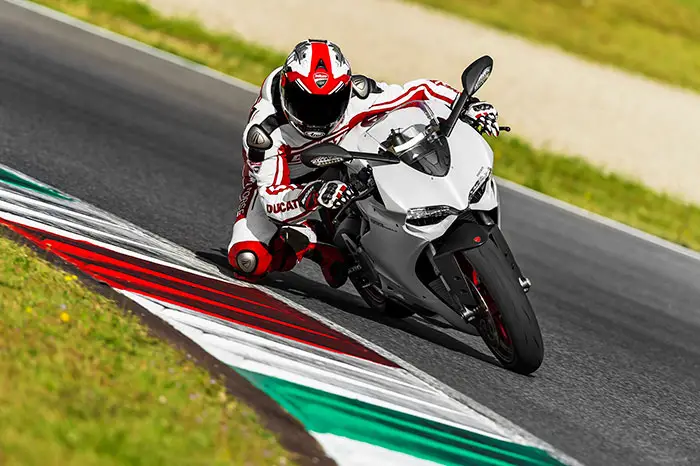
2014 Ducati Superbike 899 Panigale
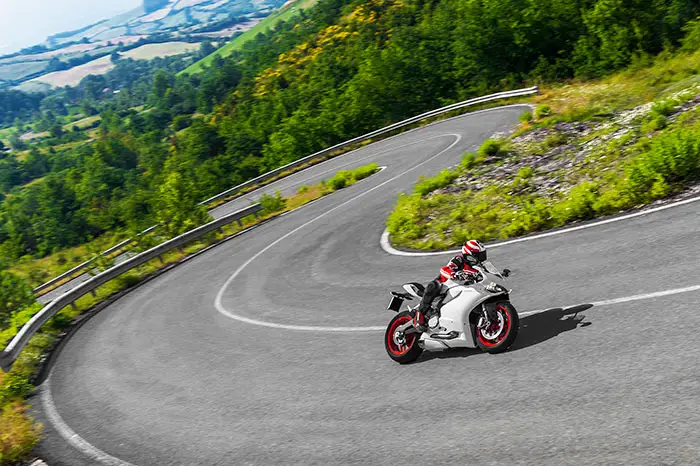
2014 Ducati Superbike 899 Panigale
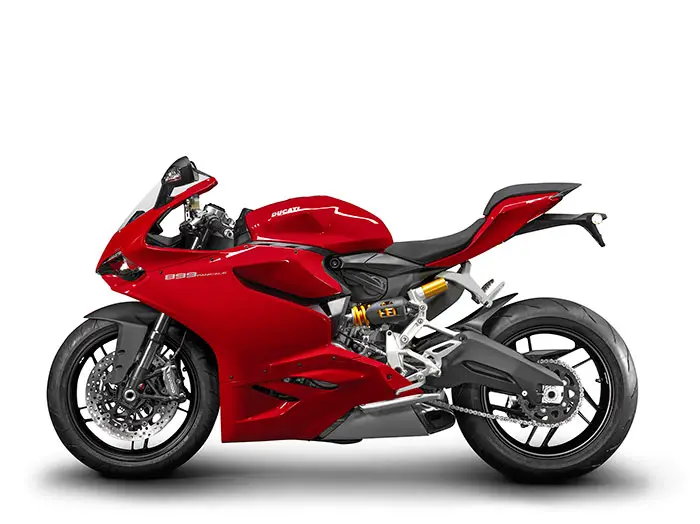
2014 Ducati Superbike 899 Panigale
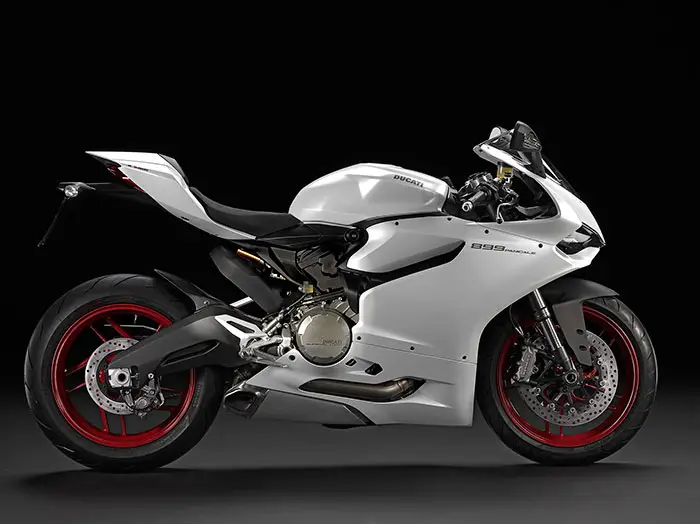
2014 Ducati Superbike 899 Panigale
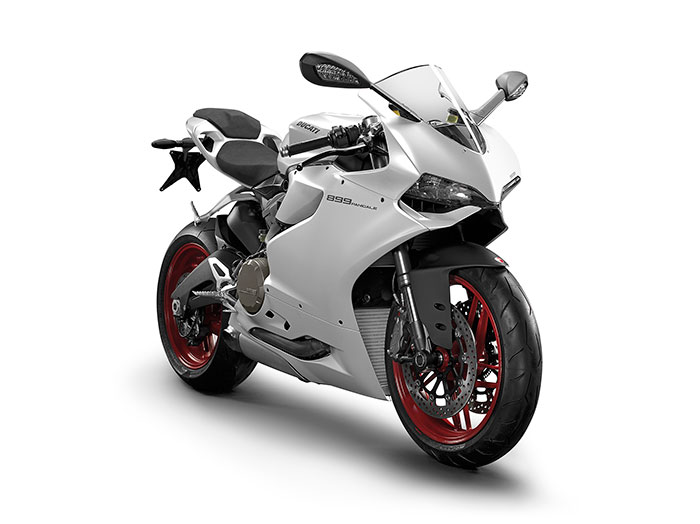
2014 Ducati Superbike 899 Panigale
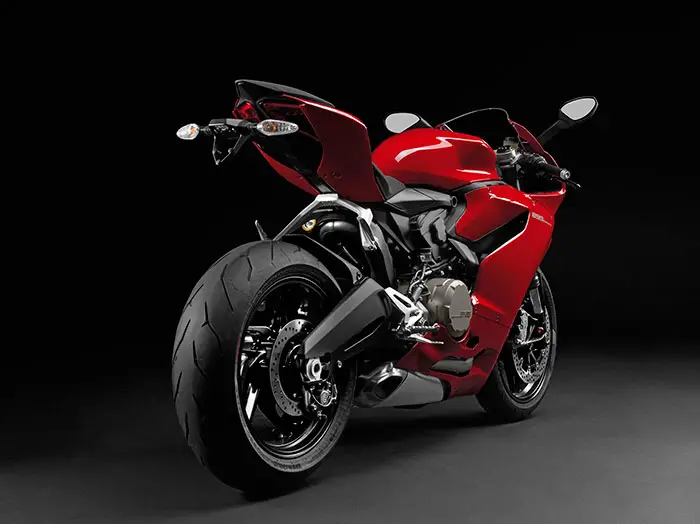
2014 Ducati Superbike 899 Panigale
2014 Ducati Superbike 899 Panigale Review
The 2014 Ducati Superbike 899 Panigale on Totalmotorcycle.com
The new 899 Panigale – Supermid perfection…
The introduction of the highly-anticipated Ducati 899 Panigale provides a new way to access the exclusive world of Ducati Superbikes with a “Supermid” version designed to provide the thrill of the new generation flagship model with the refined character of an everyday streetbike.
The brand new Superquadro engine features a revised bore and stroke for a broad power delivery, producing 148hp (109kW) with a torque of 73lb-ft (10.1kgm). The super-smooth power unit continues to be a fully stressed member of the innovative Panigale monocoque construction, achieving both an outstanding power-to-weight ratio and ride-enhancing agility with a dry weight of 169kg (372.5lb). An 1199 silhouette underlines the family DNA, while the Ducati Quick Shift (DQS) and the fully integrated Riding Mode technologies of Ride-by-Wire, triple stage ABS, Ducati Traction Control (DTC) and Engine Brake Control (EBC) continue the benchmark ingenuity introduced with the award-winning Panigale.
Ducati’s constant pursuit of perfection now offers all-round performance for connoisseurs with an authentic and stylish way to enter the world of high performance. The 899 Panigale is available in traditional Ducati red with black wheels or a stunning arctic white silk with red wheels.
The best of both worlds
Ducati is passionately committed to further development of the Panigale concept both on the track and on the street and the 899 represents a “Supermid” version, intended to be a method of entry into the world of premium performance. With carefully designed, rider-friendly features, like increased seat cushioning and shorter final drive gearing for enhanced mid-range rideability, the new model achieves a successful mix of authentic Italian performance with everyday usability, offering the very best of both worlds in absolute style.
The innovative “monocoque” frame solution and the new 899 “Superquadro” L-twin engine uses race-derived electronics to continue the “bred for the track and trained for the road” mentality. This initiative further demonstrates how innovative Ducati World
Championship level technology has a direct contribution to ride improvement and safety enhancement.
With the click of a button, Ducati’s Riding Mode concept delivers performance with enhanced rider confidence by combining a number of class-leading technologies. The latest-generation sports ABS system, Ducati Traction Control (DTC), Ducati Quick-Shift (DQS), Ducati’s race-derived Engine Brake Control (EBC) and Ride-by-Wire (RbW) are now all programmed into seamless, electronic rider assistance.
Pronounced “Pan-ee-gah-lee”, the model represented a change in Ducati Superbike tradition, adding a name to its engine capacity designation and making a significant association to its historic roots in the Borgo Panigale area of Bologna. In an Italian territory known as “Motor Valley” and where high performance and racing runs through the veins of its passionate people, Ducati have underlined their pride in being world ambassadors for the “Made in Italy” title by immortalizing their birthplace in the name of the new generation Superbike.
Unmistakably Ducati
Every detail of the Panigale pays tribute to the rich heritage of racing on which Ducati is built. Components that are not only functionally efficient, but also minimalist, essential and beautifully engineered into pieces of automotive art.
Climb aboard the Panigale and take hold of the bars and the feeling of pure racing is everywhere. The finely formed top-clamp with weight-saving hollows and recesses immediately communicates Italian engineering at its very best. Radial brake and clutch pumps,
Ducati’s precise switchgear and full Ride-by-Wire twistgrip give a race-driven sense of minimalism further enhanced with the monocoque-integral steering head flowing into the front sub-frame and minimalist instrumentation.
The twin headlamps, with LED positioning lights, are integrated with the frontal intake ducts, while the twin rear lights are moulded perfectly around the recessed seat air ducts and illuminate with an attractive light-guide surround effect, enhanced with LED brake lights. Front LED indicators are integrated into the mirror bodies and rear indicators, which are also LED*, are styled with clear lenses.
The majority of the frontal air ducts feed the main airbox, while a small splitter diverts air also into the fairing bodywork to ensure efficient cooling for the onboard electronics. The carefully executed shape at the rear of the fairing enables a highly efficient exit from the radiator area, protecting the Superquadro’s power output and further reducing aerodynamic resistance. The sleek shape of the seat and tail-piece is accentuated by the under-engine location of the exhaust system, further enhancing the aggressive stance of a true Ducati Superbike. *Country specific
2014 Ducati Superbike 899 Panigale Totalmotorcycle.com Key Features
Your road to the track
The revolutionary technology found in the Monoscocca frame and Superquadro engine, 148 HP delivered with incredible lightness and unprecedented agility, the unmistakable design, Ducati Quick Shift and ABS fitted as standard. This all ensures that the 899 Panigale is just the bike to give a Ducati Superbike adrenalin rush, both on the track and on the road.
2014 Ducati Superbike 899 Panigale Totalmotorcycle.com Features and Benefits
Engine
The 899 Superquadro
Ducati’s latest power-plant, the 899 Superquadro, represents another major step forward in twin-cylinder design and technology, generating superb Ducati performance with super smooth power delivery. Providing 148hp (109kW) @ 10,750rpm and 10kgm (73lb-ft) @ 9,000rpm, the new engine achieves a perfect balance of drive and fluidity using a bore and stroke of 100mm x 57.2mm (3.93in x 2.25in). The Desmodromic, 90° L-twin inherits the 1199’s structural design to enable full integration with the monocoque chassis while boasting an ownership-friendly 24,000km (15,000 miles) between major services.
Engine architecture
Mirroring the innovative 1199, the 899 engine is a fully stressed member of the chassis, with its architecture calculated to provide the best possible vehicle construction for layout, weight distribution and strength. The cylinders, which remain at 90° to each other, are rotated backwards around the crankcases, positioning the front cylinder at 21° from horizontal and enabling the engine to be positioned further forwards for optimum front / rear weight distribution and perfectly positioning the cylinder head attachment points for the Panigale’s monocoque frame.
The crankcases, which are vacuum die-cast using Vacural® technology to ensure optimal weight saving, consistent wall thickness and increased strength, also incorporate the outer water-jacket of the “cylinder”, eliminating the jointing face that used to exist at the base of the cylinders. Instead, the Superquadro has separate nikasil-coated “wet-liners” inserted into the tops of the crankcase apertures. This design enables secure fixing of the cylinder head directly to the crankcase, improved sealing and enhanced heat dissipation from the thin cylinder-liners directly into the surrounding coolant. The clutch casing, sump and cam covers are all cast in aluminium.
The 899 Superquadro crankcases use shell main bearings for the crankshaft, enabling an increase in diameter of the crank journals for enhanced rigidity and an increase in the crankcase section around the main bearing area for improved strength. The shell bearings are force-fed oil from internal drillings within the main bearing pillars to keep the new crankshaft well lubricated and the oil is quickly scavenged back into the sump with a highly efficient GP-style vacuum pump. The pump is driven by the main oil pump shaft and effectively maintains constant vacuum in the crankcase area below the pistons, reducing atmospheric resistance during the down-stroke of the piston and controlling the internal “breathing” of the engine.
Supermid precision
In calculating the optimum configuration for a “Supermid” 899 version of the Superquadro, Ducati engineers selected a bore and stroke of 100mm x 57.2mm (3.93in x 2.25in). The combination of power and ridability resulted in an impressive output of 148hp (109kW) @ 10,750rpm and 73 lb-ft (10.1kgm) @ 9,000rpm.
The bore and stroke ratio achieves an attractive balance of torque while allowing sufficient area for the highly efficient valve diameters of 41.8mm (1.64in) inlet and 34mm (1.33in) exhaust. The valves are actuated by ‘super-finished’ and diamond-like carbon (DLC) coated rocker arms for reduced friction and fatigue.
The 899’s volumetric efficiency is achieved with the help of oval throttle bodies measuring an equivalent diameter of 62mm (2.44in) that feed air across a single injector per cylinder positioned below the Ride-by-Wire controlled butterfly. The new engine also inherits the 1199’s secondary air system, maintaining performance-optimised fuel mapping for smoother cycle-to-cycle engine operation, without compromising emissions.
Desmodromic valve control
Ducati’s Desmo system actuates valve closure mechanically with the same method and accuracy as it opens, enabling steep cam profiles, radical cam timings, large valves and high operating speeds. This system is used in every Ducati engine and constantly proven on Ducati Corse’s World Superbike and Desmosedici GP motorcycles.
The Desmodromic assembly is driven by a combined chain and gear-drive arrangement with a conventional bush-type chain running from the crankshaft to the cylinder head, where a single sprocket positioned between inlet and exhaust camshafts is attached back-to-back to a gear wheel mounted on its own short, dedicated shaft. The attached gear meshes directly with gears on the ends of both the inlet and exhaust camshafts, which are also designed with +/- position adjustment for ultra-precise cam-calibration. The cam chain provides a highly efficient point-to-point drive route and, tensioned automatically, provides continuous reliability, further reducing the cost of routine maintenance.
On the end of each exhaust cam drive gear is a centrifugal flyweight which retracts at speeds below tick-over to rotate a “protrusion” from the concentric section of the cam, thus creating sufficient valve lift to act as a de-compressor. This ingenious device enables the
Superquadro engine to be started easily without using a larger battery and starter motor, which has further helped the reduction of overall vehicle weight. When the engine starts and the camshafts begin to rotate at tick-over speed, the centrifugal flyweight flicks out, retracting the “protrusion” back into the cam and allowing complete valve closure for full compression. This innovative feature further underlines the lengths to which designers and engineers have worked together in the single-minded pursuit of weight-saving.
Transmission
The 899 Superquadro engine adopts the same gearbox as the 1199, capitalising on the extensive work carried out in increasing dimensions between the centres of the six-speed gearbox shafts to enable larger diameter, stronger gears to transmit the enhanced power output.
Chassis
Monocoque technology
The 899 Panigale’s chassis continues Ducati’s innovative and courageous step forward in motorcycle design, merging multiple parts into one compact and lightweight component, while re-evaluating rider posture with a revised ergonomic triangle. The extremely compact monocoque construction integrates the airbox to become one of the key elements in reducing the overall dry weight to an impressive of 169kg (372.5lb).
Using the Superquadro engine as a stressed member of the chassis, the short and strong aluminium monocoque is die-cast in aluminium and attaches to the cylinder heads protruding forward to house the steering head bearings and forming the airbox. Continuing the concept of component minimisation, the airbox is capped-off and sealed by the underside of the 17 litre (4.5 US gallon) steel fuel tank.
While the cylinders remain true to Ducati’s signature 90° L-twin configuration, the Superquadro engine has effectively rotated the top-end backwards around the crankshaft to enable engineers to position the engine perfectly for optimum front/rear weight bias.
With a front-end geometry of 24° of rake and 96mm (3.78in) of trail, a brand new, fully die-cast aluminium, double-sided swingarm provides the wheelbase of 1,426mm (56.14in) setting the weight distribution of the 899 Panigale at 52% front and 48% rear.
With the exhaust system located below the engine, the steel tubular rear sub-frame maintains a clean line and attaches directly to the Superquadro engine, while the lightweight, aluminium front sub-frame attaches directly to the monocoque frame, providing secure support for the headlamp, instrumentation and fairing. This centralisation of mass substantially contributes to overall vehicle agility.
Suspension
The 899 Panigale is eqiuipped with 43mm Showa BPF usd forks, fully adjustable in spring pre-load and compression and rebound damping. The bodies are finished in titanium grey and the sliders in chrome and feature forged radial calliper mountings on the fork feet. The Showa Big Piston Fork (BPF) enhances damping control at low suspension speeds by flowing more oil at lower pressures and reducing the range over which the damping fluid has to flow during compression and extension. This innovative solution improves performance, while achieving a weight reduction compared to traditional forks. A steering damper completes the overall specification.
A fully adjustable Sachs rear suspension unit features a stylish and practical side-mounting, enabling increased space for the rear cylinder head. The unique positioning renders the suspension unit totally accessible for spring pre-load and compression and rebound damping and is designed with a progressive linkage operating through a double-sided swingarm.
Bosch Brembo braking system with 3-level ABS
Included as an integral part of the Ducati Safety Pack (DSP), the 899 Panigale is equipped with the Bosch ABS 9MP controlled Brembo braking system, an impressive combination of state-of-the-art security and proven performance. Shorter stopping distances with enhanced stability is further enhanced with full Riding Mode integration taking the 899’s braking to the next level of rider feeling.
From the 3-level programmed system, level-1 enables front only ABS, intended for the track-oriented “Race“ Riding Mode, while level-2 delivers high braking performances with reduced rear lift-up prevention for sport-oriented road use in “Sport“ Riding Mode. Level-3, used in the “Wet“ Riding Mode, delivers the most braking stability with maximum lift-up prevention. An option to disable the ABS in each individual Riding Mode is available via the instrumentation, and the system allows the setting to be saved and memorised at the next ignition-on.
The front brakes use twin radially-mounted Brembo, four piston, Monobloc M4-32 callipers actuated by a high performance radial master cylinder. The fronts grip 320mm discs, while a single 245mm disc on the rear is gripped by a single Brembo calliper.
Wheels and tyres
The 899 Panigale rolls on lightweight 10-spoke wheels in 3.5in front rim width and 5.50in rear, enabling a fast change of direction and enhanced acceleration and braking performances. They are fitted with Pirelli Diablo Rosso Corsa tyres with a 120/70 ZR17, on the front and an agility-enhancing 180/60 ZR17 on the rear.
Designed as a high performance tyre for the road and excellent for track sessions, the Pirelli Diablo Rosso Corsa profile and structure make it a perfect choice for the 899 Panigale with optimum support ensured during vehicle inclination and rapid realignment on corner exit. Developed with Pirelli’s latest Enhanced Patch Technology from World Superbike, the tyre uses a multi-compound composition with three zones on the rear that optimise the area of contact, ensuring maximum grip on road and track.
Electronics
Panigale technology
The superb electronics package features Ducati Riding Modes, with fully integrated ABS, Ducati Traction Control (DTC), Ducati Quick Shift (DQS), Engine Brake Control (EBC), and full Ride-by-Wire (RbW) throttle control.
Ducati Riding Modes
Ducati’s industry-changing Riding Modes effectively offer an optimised set-up appropriate to rider and environment by selecting from a choice of three pre-set modes. Each Riding Mode is pre-programmed to instantly change engine character in addition to ABS, DTC and EBC levels – even while riding. The modes are made possible by combining a number of class-leading technologies.
An electronic Ride-by-Wire (RbW) system administers different mappings to regulate power delivery, while the Ducati Traction Control system (DTC) uses eight levels of system interaction to enhance control by reducing wheel-spin and the 9MP generation Bosch processor provides three environment-appropriate anti-lock levels. EBC monitors crankshaft de-acceleration under heavy braking and administers RbW throttle opening to maintain optimum grip.
Race Riding Mode
The Race Riding Mode provides the track rider with 148hp with direct RbW throttle response, reduced DTC system intervention, a race-oriented EBC level and front-only ABS with no anti-rear lift-up.
Sport Riding Mode
The Sport Riding Mode provides the road or track rider with 148hp, delivered with a “smooth” RbW throttle response, slightly increased DTC system intervention, a sport-optimised EBC and front and rear ABS with increased anti-rear lift-up.
Wet Riding Mode
The Wet Riding Mode provides the road or track rider with 110hp, delivered with a “smooth” RbW throttle response, increased DTC system intervention, environment-appropriate EBC and fully enhanced ABS for low grip conditions.
Instrumentation
The 889 Panigale has a brand new compact instrumentation panel with a well arranged and data-rich black on white LCD display.
The unit displays RPM from 0-12,000 in an easy-to-read bargraph positioned in a semi-circular shape across the top of the unit with speed indicated prominently in the centre of the screen.
The three riding modes of Race, Sport and Wet are positioned left of the vehicle speed value and are easily scrollable using the indicator cancel button on the left-hand switchgear. When each Riding Mode is selected its corresponding EBC, DTC and ABS levels are displayed to the right of the vehicle speed value with additional tags displayed above them to confirm Stopwatch, DDA or DQS functions when activated.
Further left of the three Riding Modes, the screen also displays a numeric gear indicator, a tag to confirm actuation of automatic lap-time GPS (if DDA+ accessory is fitted) and a service icon which appears to remind of scheduled maintenance.
Engine coolant temperature is displayed at the lower centre section of the screen with rectangular windows of additional data positioned either side, scroll-controlled using two buttons positioned above and below the indicator cancel button on the left-hand switchgear. The upper button scrolls the left window to present total mileage, trip A, trip B, trip reserve fuel, trip time, time and lap time, while the lower button scrolls the right window for air temperature, fuel consumption, average fuel consumption and average speed.
Illuminated icons on the top left of the instrumentation, from left to right, show warnings for left turn signal, engine electronics, ABS-off and neutral, while from top right of the instrumentation, from right to left, are turn signal right, fuel reserve, main beam and oil pressure. In the middle of these two banks of warning lights, and designed to advise via the rider’s peripheral vision, are a strip of red lights incrementally counting-up to engine over-rev, until finally illuminating also the main red over-rev warning light in the top centre of the display. Below the main top, centre over-rev bar is a second bar that illuminates orange to denote DTC interaction.
When the 899 Panigale is stationary, the instrumentation is accessible as a user-friendly control panel to personalise and save ABS, EBC, DTC, DQS, and RbW settings within each Riding Mode. Additionally, the stopwatch function, actuated manually by using the flasher button on the left-hand switchgear (or automatically with the GPS equipped DDA+ available as an accessory) can list the last 30 recorded lap times, each time also recording the associated lap number, maximum speed and maximum rpm. The brightness level of the display can also be adjusted from the same control panel area.
Ducati Traction Control (DTC)
Ducati’s highly successful DTC system has been further refined for the 899 Panigale and fully integrated into the electronics package of the Riding Modes. It uses the same software logic developed and used by Ducati Corse for their MotoGP and World Superbike motorcycles and offers a choice of eight settings highly developed for all environments.
Accessible from the left-hand switchgear and displayed on the instrumentation, the system offers a choice of eight profiles, each one programmed with a wheel-spin tolerance graded from one to eight. While level eight administers a confidence-building, high level of interaction from the system by activating upon the slightest detection of wheel-spin, level one offers a much higher tolerance and so reduced intervention for highly competent riders. The DTC system status and level is constantly displayed on the instrumentation, reminding the rider of the current interaction level if the Riding Mode is changed.
When the level that best suits the combination of road or track conditions and riding style has been selected and the DTC system activated, front and rear wheel sensors compare speed differential to sense when rear traction is being broken (wheel-spin). DTC then decides the best combination of two different types of instant electronic adjustment, calculated with data supplied from multiple sources. The first ‘soft’ stage of system interaction is executed by high speed software that makes instant electronic adjustment to the ignition timing, administering varying amounts of ignition retardation to reduce the engine’s torque. If the DTC software detects that the first ‘soft’ stage of system interaction is inadequate to control the wheel-spin, it continues to administer ignition retardation and, in addition, instructs the engine ECU to initiate a pattern of constantly increasing injection cuts until, if necessary, full injection cut.
During both stages of system interaction, an orange warning light, which is visible in the rider’s peripheral vision and situated near the top of the instrumentation, illuminates to signify that DTC is being used. As soon as the system recognises the gradual return of equal wheel speeds, it incrementally re-establishes normal power delivery. This seamless interaction is key to the super-smooth operation of the system.
Ducati Quick Shift (DQS)
The Ducati Quick Shift (DQS) system, is supplied as original equipment on the 899 Panigale, providing super-smooth clutchless upshifts, easily executed without closing the throttle. Normally used specifically for racing, the system allows the rider to keep the throttle open when changing-up through the gearbox, helping to save vital fractions of a second in the pursuit of faster lap-times, and providing ride-enhancing performance for normal road use. The system not only saves time when changing gear, but also enables the possibility of uninterrupted air flow through the throttle bodies throughout the upward gear-change process.
The system consists of a micro-switch built into the linkage of the gear change lever, which when actuated in the direction of selecting a higher gear, sends a signal to the main ECU. The ECU instantly understands which gear the motorcycle is in and the amount of throttle opening before applying a pre-programmed cut in fuel injection and ignition measured in milliseconds. This spilt-second electronic interruption in drive is programmed precisely to allow the next gear to be selected without having to actuate the clutch or close the throttle. As the system only functions for a matter of milliseconds, the 899 can still be ridden using a normal gear-changing style.
Engine Brake Control (EBC)
The “Engine Brake Control” (EBC) system was developed by Ducati Corse to help riders optimise vehicle stability under extreme corner-entry racing conditions by equalising the positive and negative forces of torque subjected to the rear tyre under severe engine-braking conditions. EBC monitors throttle position, gear selected and crankshaft de-acceleration rate under heavy braking, and then administers precise RbW throttle openings to balance the torque forces acting on the tyre. EBC has a 3-level operating system accessible from the 899 Panigale’s instrumentation and is integrated automatically into its three Riding Modes to provide an additional and highly effective rider aid.
DDA-ready
The 899 Panigale is system-ready to accept Ducati Data Analyser+ (DDA+) which is available as an accessory from Ducati Performance. It consists of a software download and a USB-ready data retrieval card and evaluates the performances of the motorcycle and its rider by graphically presenting specific channels of information.
DDA+ is the latest generation of the system and incorporates a GPS function that automatically records lap-times every time the 899 Panigale crosses a circuit start/finish line. As the rider crosses line and presses the lights flasher button, the innovative system logs the coordinates of that position and automatically records each lap time as the motorcycle completes subsequent laps.
An essential piece of equipment for the circuit, DDA records numerous channels of data including throttle opening, vehicle speed, engine rpm, gear selected, engine temperature, distance travelled, laps and lap times. An additional channel of information is dedicated to recording the traction control index which can then be viewed as a graphic trace indicating the amount of DTC interaction during wheel-spin. At the end of a ride or track session, data can be downloaded ready to compare and analyse the performance of the rider and motorcycle.
2014 Ducati Superbike 899 Panigale – Totalmotorcycle.com USA Specifications/Technical Details
US MSRP Price: See dealer for pricing in USD
Engine
Type Superquadro: L-twin cylinder, 4 valve per cylinder,
Desmodromic, liquid cooled
Displacement 898cc
Bore x Stroke 100 x 57.2mm
Compression Ratio 12.5:1
Power 148hp (109kw) @ 10,750rpm
Torque 73lb-ft (99Nm) @ 9,000rpm
Fuel injection
Mitsubishi electronic fuel injection system.
Single injector per cylinder.
Full ride-by-wire elliptical throttle bodies.
Exhaust 2-1-2 system with catalytic converter and 2 lambda probes.
Twin stainless steel mufflers with alumimum outer sleeves
Emissions Euro 3
Transmission
Gearbox 6 speed
Ratio 1=37/15 2=30/16 3=27/18 4=25/20 5=24/22 6=23/24
Primary drive Straight cut gears, Ratio 1.77:1
Final drive Chain 520; Front sprocket 15; Rear sprocket 44
Clutch Wet multiplate clutch with hydraulic control
Chassis
Frame Monocoque aluminum
Wheelbase 1,426mm (56.14in)
Rake 24°
Trail 96mm (3.78in)
Steering angle (total) 52°
Front suspension Showa BFP 43mm fully adjustable usd fork
Front wheel travel 120mm (4.72in)
Front wheel 10-spoke light alloy 3.50″ x 17″
Front tyre 120/70 ZR17 Pirelli Diablo Rosso Corsa
Rear suspension
Fully adjustable Sachs unit.
Progressive linkage
Cast aluminum double-sided swingarm.
Rear wheel travel 130mm (5.12in)
Rear wheel 10 spoke light alloy 5.50″ x 17″
Rear tyre 180/60 ZR17 Pirelli Diablo Rosso Corsa
Front brake 2 x 320mm semi-floating discs, radially mounted Brembo
Monobloc M4-32 callipers with ABS
Rear brake 245mm disc, 2-piston calliper
Fuel tank capacity 17l (4.5 gallon US)
Dry weight 169kg (372.5lb)
*Wet weight 193kg (425.5lb)
Seat height 830mm (32.48in)
Max height 1100mm (43.31in)
Max length 2075mm (81.69in)
Instrumentation LCD
Ducati electronics DTC, DQS, EBC, Riding Modes
Warranty 2 years unlimited mileage
Versions Dual seat
2014 Ducati Superbike 899 Panigale – Totalmotorcycle.com Canadian Specifications/Technical Details
Canada MSRP Price: See dealer for pricing in CDN
Engine
Type
Superquadro: L-twin cylinder, 4 valve per cylinder, Desmodromic, liquid cooled
Displacement
898cc
Bore x Stroke
100×57.2mm
Compression ratio
12.5:1
Power
109 kW (148 hp) @ 10,750 rpm
Torque
99 Nm (73.0 lb-ft) @ 9,000 rpm
Technical data referring to power and torque was measured on an engine test stand at Ducati.
Fuel injection
Electronic fuel injection system. Single injector per cylinder. Full ride-by-wire elliptical throttle bodies.
Exhaust
2-1-2 system with catalytic converter and 2 lambda probes. Twin stainless steel mufflers with alumimum outer sleeves
Transmission
Gearbox
6 speed with DQS Ducati Quick Shift
Primary drive
Straight cut gears, Ratio 1.77:1
Ratio
1=37/15 2=30/16 3=27/18 4=25/20 5=24/22 6=23/24
Final drive
Chain 520; Front sprocket 15; Rear sprocket 44
Clutch
Wet multiplate clutch with hydraulic control
Chassis
Frame
Monocoque Aluminium
Front suspension
Fully adjustable BPF forks. 43 mm chromed inner tubes
Front wheel
10-spoke light alloy 3.50″ x 17″
Front Tyre
120/70 ZR17 Pirelli Diablo Rosso Corsa
Rear suspension
Fully adjustable unit. Aluminum double-sided swingarm
Rear wheel
10 spokes light alloy 5,50”x17”
Rear tyre
180/60 ZR17 Pirelli Diablo Rosso Corsa
Front wheel travel
120mm (4.72in)
Rear wheel travel
130mm (5.12in)
Front brake
2 x 320mm semi-floating discs, radially mounted Brembo Monobloc M4.32 4-piston callipers ABS as standard equipment
Rear brake
245mm disc, 2-piston calliper ABS as standard equipment
Instrumentation
Full LCD Display
Dimensions and weight
Dry weight
169kg (372.5lb)
Weight data refers to the dry weight of the motorcycle without battery, lubricants and coolants for liquid-cooled models.
Wet weight (KERB)
193kg (425.5lbs)
Kerb weights indicate total bike weight with all operating consumable liquids and a fuel tank filled to 90% of capacity (as per EC standard 93/93).
Seat height
830mm (32.48in)
Wheelbase
1426mm (56.14in)
Rake
24°
Trail
96mm (3.78in)
Fuel tank capacity
17l – 4.5 gallon (US)
Number of seats
Dual seat
Standard Equipment
Riding modes, Power modes,ABS, DTC, DQS, EBC, Fully RbW, DDA+ ready
Additional equipments
Passenger footpegs kit
Warranty
24 months unlimited mileage
Maintenance service intervals
12.000 km (7.500m)/12 Months
Valve clearance check
24.000km (15,000m)
Emissions and Consumption
Standard
follows the US Federal Regulation
2014 Ducati Superbike 899 Panigale – Totalmotorcycle.com United Kingdom Specifications/Technical Details
British MSRP Price: £ On-the-road price, see dealer for pricing in GBP
Engine
Type
Superquadro: L-twin cylinder, 4 valve per cylinder, Desmodromic, liquid cooled
Displacement
898cc
Bore x Stroke
100×57.2mm
Compression ratio
12.5:1
Power
109 kW (148 hp) @ 10,750 rpm
Torque
99 Nm (73.0 lb-ft) @ 9,000 rpm
Technical data referring to power and torque was measured on an engine test stand at Ducati.
Fuel injection
Electronic fuel injection system. Single injector per cylinder. Full ride-by-wire elliptical throttle bodies.
Exhaust
2-1-2 system with catalytic converter and 2 lambda probes. Twin stainless steel mufflers with alumimum outer sleeves
Transmission
Gearbox
6 speed with DQS Ducati Quick Shift
Primary drive
Straight cut gears, Ratio 1.77:1
Ratio
1=37/15 2=30/16 3=27/18 4=25/20 5=24/22 6=23/24
Final drive
Chain 520; Front sprocket 15; Rear sprocket 44
Clutch
Wet multiplate clutch with hydraulic control
Chassis
Frame
Monocoque Aluminium
Front suspension
Fully adjustable BPF forks. 43 mm chromed inner tubes
Front wheel
10-spoke light alloy 3.50″ x 17″
Front Tyre
120/70 ZR17 Pirelli Diablo Rosso Corsa
Rear suspension
Fully adjustable unit. Aluminum double-sided swingarm
Rear wheel
10 spokes light alloy 5,50”x17”
Rear tyre
180/60 ZR17 Pirelli Diablo Rosso Corsa
Front wheel travel
120mm (4.72in)
Rear wheel travel
130mm (5.12in)
Front brake
2 x 320mm semi-floating discs, radially mounted Brembo Monobloc M4.32 4-piston callipers ABS as standard equipment
Rear brake
245mm disc, 2-piston calliper ABS as standard equipment
Instrumentation
Full LCD Display
Dimensions and weight
Dry weight
169kg (372.5lb)
Weight data refers to the dry weight of the motorcycle without battery, lubricants and coolants for liquid-cooled models.
Wet weight (KERB)
193kg (425.5lbs)
Kerb weights indicate total bike weight with all operating consumable liquids and a fuel tank filled to 90% of capacity (as per EC standard 93/93).
Seat height
830mm (32.48in)
Wheelbase
1426mm (56.14in)
Rake
24°
Trail
96mm (3.78in)
Fuel tank capacity
17l – 4.5 gallon (US)
Number of seats
Dual seat
Equipments
Standard Equipment
Riding modes, Power modes,ABS, DTC, DQS, EBC, Fully RbW, DDA+ ready
Additional equipments
Passenger footpegs kit
Warranty
Warranty
24 months unlimited mileage
Maintenance service intervals
7,500m/12 Months
Valve clearance check
24.000km (15,000m)
Emissions and Consumption
Standard
Euro 3
Specifications, features and prices to change by manufacturer without notice. Information from Total Motorcycle.com; All information correct as of posted date.


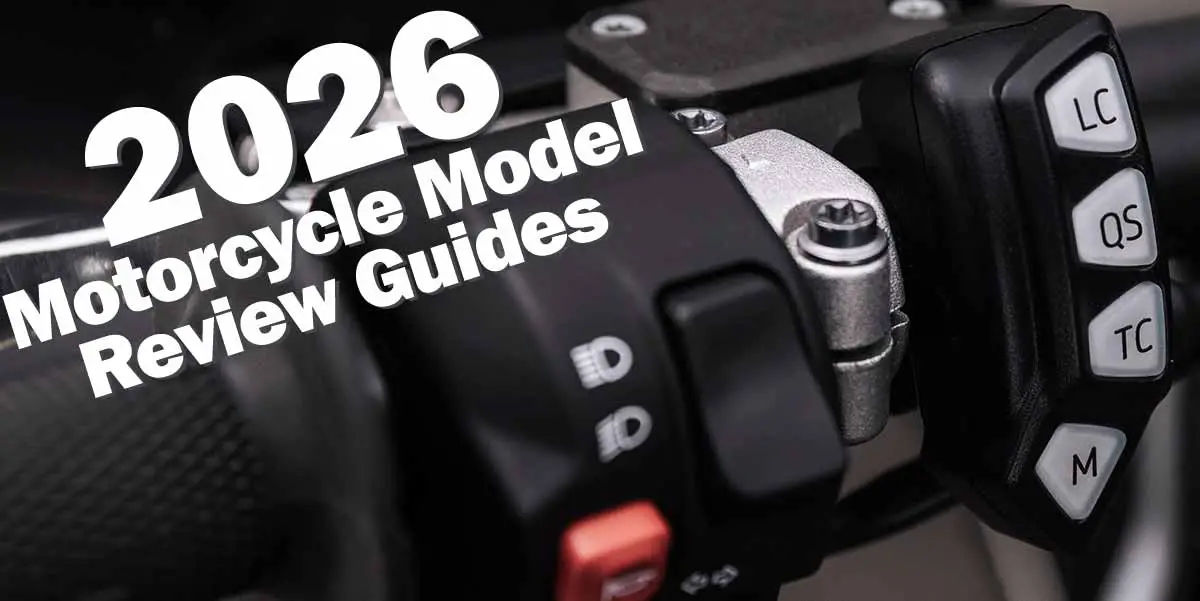
Be the first to comment